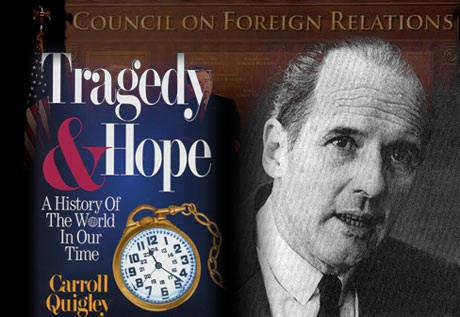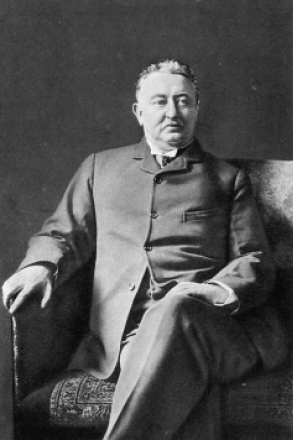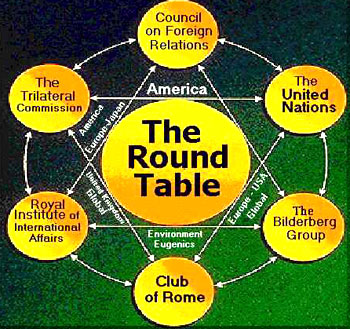
Carroll Quigley was one of the foremost professors of history in the U.S. he taught at Georgetown University and was Bill Clinton's mentor and recommended Clinton for his Rhodes scholarship. Quigley was the official historian for the Council of Foreign Relations (CFR) and was chosen to write the CFR's official history in the 1960s. Quigley said he liked the aims of Cecil Rhodes secret society and he called the members "Rhodesians" Quigley was, I believe, what Lenin called a useful idiot. Quigley naively believed that the CFR would allow him to publish their history that he entitled "Tragedy and Hope". Quigley's book was intended for the inner circle of the CFR, not the general public. After the first week of sales Quigley's book was flying off the shelves. Macmillan Publishers suddenly stopped printing "Tragedy and Hope" much to Quigley's displeasure and he sued them. Quigley's book is massive, dull and approximately 1300 pages but it has hidden nuggets that startle the reader. One will stop and say wow, did he really write that?
 .
.https://www.youtube.com/watch?v=ynVqPnMQ2sI
https://www.youtube.com/watch?v=XD8NIRk8Hmo
Above, are two links called "The Quigley Formula" and "A Powerful Documentary by G. Edward Griffin" that describes the secret society of "Rhodesians". You can't fricunderstand the Illuminati or other secret societies unless you understand the "Rhodesians". I thought about putting Carroll Quigley's videos from the 1960s and early 70s above but the audio quality is poor, and Griffin's videos are better at describing this worldwide conspiracy. In order to understand the U.S., the world and its political scene today I feel one must watch Griffin's videos.
I believe that one of the most important
men of the 20th century was Cecil Rhodes who is pictured above. Rhodes was one of the wealthiest
people in the world. He owned the vast Gold mine, diamond mines and other wealth in South Africa and other parts of Africa.
Rhodes connived his way to wealth in a
lawless frontier culture, then used that fortune to fund a private invasion of
East Africa. He bought newspapers in order to shape and control public opinion.
He brokered secret deals, issued bribes and used gangs of mercenaries to
butcher his opponents, seizing close to a million square miles of territory
from its inhabitants. Although he did this in the name of the British Empire if and when it suited him he worked against Britain’s imperial interests, for example, he slipped £10,000 to Parnell’s Irish nationalists. He had no moral scruples when it came to procuring money.
When Rhodes, pictured in the cartoon above, began his studies at Oriel
College, he returned to South Africa each vacation to attend to his mining
interests – which, by his mid-thirties, had made him, in today’s terms, a multi-billionaire.
By 1891, he had amalgamated the De Beers mines under his control, giving him
dominion over 90 per cent of the world’s diamond output. He had also secured
two other important positions; Prime Minister of the British Cape Colony, and
president of the British South Africa Company, an organization that was formed
– in the manner of the old East India companies – to pursue expansionist
adventures for which sponsoring governments did not have the stomach or the
cash. The result of his endeavors produced new British annexations: Nyasaland
(now Malawi), Northern Rhodesia (now Zambia) and Southern Rhodesia (now
Zimbabwe). Rhodes imprinted his personality on the region with monarchical
energy: dams, railways, towns, etc. Rhodes was asked once, what advantage do
you see to the English race in the acquisition of new territory? Rhodes replied: “Great Britain is a very small
island. Great Britain’s position depends on her trade, and if we do not open up
the dependencies of the world which are at present devoted to barbarism, we will be shut out the world’s trade. It must be brought home to you that your trade is
the world, and your life is the world, not England. That is why you must deal
with these questions of expansion and retention of the world".
Rhodes, a eugenicist, made the comment above. He was also asked why he didn’t marry
and he replied, “I know everybody asks why I do not marry. I cannot get
married, I have too much work on my hands.” Instead, he accumulated a shifting
entourage of young men, known as “Rhodes lambs”.
Rhodes was asked by a friend
how long he would endure in memory, and with his huge ego he replied: “I give myself four
thousand years.” Rhodes once said, “I
would annex the planets, if I could. In
1877, he first made his will and urged his executors to use his fortune to
establish a secret society that would aim to redden (worldwide British imperialism) every area of the planet. He envisioned a British world, a truly British
imperial government. Rhodes believed in the ultimate destiny of the Anglo-Saxon
race. Rhodes dwelt repeatedly on the fact that England's great need was new
territory fit for the overflow British population to settle in permanently, and thus
provide markets for English wares, “the workshop of the world.” It was Rhodes
dream of English Lebensraum.
Rhodes paid a mercenary army from England
and stocked them with Maxim machine guns, with just 5 machine guns the English
slaughtered 5,000 African people in one afternoon alone–then they celebrated
with dinner and champagne. Rhodes said he, “thoroughly enjoyed the outing.” Saw
the slaughter of inferior Africans as sport and adventure. Cecil Rhodes helped set up
the brutal apartheid system in south Africa. He passed laws and imposed
colonial taxation of African people in order to force them to work as near
slave labor in the diamond mines. When
Cecil Rhodes died the DeBeers diamond cartel was taken over by the wealthy and powerful Oppenheimer
family.

Rhodes formed a secret society for his British Imperial purpose. He believed that it was essential that his secret society should have
no name and until this day it has none. Its goal was and is to form a
collectivist New World Order (NWO) that rules the world in a feudal system. Their goal is no different than the communist collectivist goal. As
we look around the world today we can see this feudal system being put into
action. For example, the U.S. and Britain have lost a lot of their manufacturing to China and
India where workers are treated like feudal serfs.
Rhodes was a Free Mason. At Oxford University in 1870 Rhodes came under the influence of the socialist John Ruskin. Ruskin gave a lecture and stated he believed that governments should takeover the means of production, that educated, superior men should rule over their fellow men and the world should be ruled by a single dictator. Rhodes copied this lecture for Ruskin and kept a copy of the lecture in his pocket for 30 years. Ruskin obviously had an immense influence on Rhodes. Rhodes also studied Adam
Weishaupt, the founder of the Illuminati and the Jesuit Order and admired them.
Rhodes secret society deliberately had no name. In order to
preserve secrecy he believed the “Rhodesians” should have a structure of larger and larger concentric circles. People in the outer circles would not know the people in the more powerful
and smaller upper circles.
Below is the circular structure of the “Rhodesians”.
1. The Leader – originally Cecil Rhodes who
was succeeded by Lord Alfred Milner; We do not know who is the leader today. I
suspect it will be the anti-christ when he arrives on the scene.
2. Society of the Elect – 2 to 4 prominent men; Under Rhodes it was: William Stead, John Milner, and Lord Esher.
3. Circle of Initiatives – originally Lord
Rothschild, Lord Balfour, Sir Harry Johnston and Albert (Lord) Grey.

4. Association of Helpers are organized as “Round
Tables” – Milner recruited young men from the upper class who would be given
Rhodes scholarships and at the proper time would be placed in power centers in various countries.
Originally, these young men were called “Milner’s Kindergarten”.
6. Royal Institute of International Affairs
(RIIA) – this exists in all British Commonwealth nations
7. CFR – originally led by J.P. Morgan and
John D. Rockefeller

No comments:
Post a Comment